Tag Archive: visual supports
March 23, 2015
by Carole Zangari -
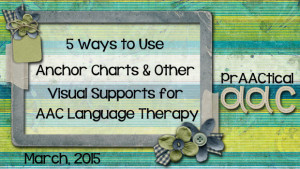
Anchor charts are a visual way to outline, describe, or illustrate a procedure, strategy, or concept. They are widely used visual supports in general education classrooms across the grade levels. In AAC therapy, anchor charts offer several benefits. First, making the anchor chart forces us to distill the main ideas in whatever it is we are teaching. What are the key aspects of what we are teaching? We have to answer that to create our anchor chart, and that gets us really thinking about the concept/process/strategy in great detail. Selecting the critical elements for our anchor chart helps us focus on the constructs that are most important to teach. Secondly, it helps us explain the concept/process/strategy in a more concise and articulate way. Putting things into writing forces us to clarify our explanations, and allows us to carefully consider what to say and how to say it. Yes, we sometimes... [Read More...]
Filed under: PrAACtical Thinking
Tagged With: AAC intervention, anchor charts, implementation ideas, visual supports
September 4, 2014
by Carole Zangari -
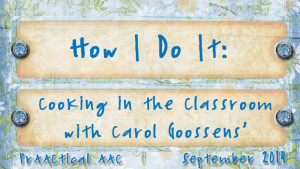
There is something about fall that puts us in the mood for cooking. Today, we are honored to learn from an AAC pioneer, Dr. Carol Goossens,’ who is an SLP and special educator based in the New York City area. She has consulted extensively in a variety of classrooms serving the full spectrum of children with special needs. Carol has presented both nationally and internationally about her collaborative work with teachers, therapists and families. She is known for her ability to seamlessly integrate technology in the classroom and for developing innovative ways to help children learn …while having fun doing it! In this post, she shares one of her latest projects, making animated recipes for using in cooking activities in the classroom. Cooking appears to be motivating for most children … the magic of putting together ingredients that ultimately become something delicious to eat. Teachers, speech-language pathologists (SLPs) and occupational therapists (OTs) often use food preparation activities... [Read More...]
Filed under: PrAACtical Thinking
Tagged With: classroom, cooking, education, recipe, visual supports
May 7, 2014
by Robin Parker -
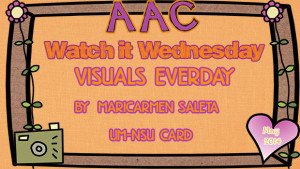
We believe all months and days should be dedicated to better speech (communication) and hearing. However, May is the official Better Speech and Hearing Month. With that in mind, no-tech visual supports help us all have better understanding and expressive communication. Watch the University of Miami and Nova Southeastern University- Center for Autism and Related Disabilities (UM-NSU CARD) webinar by Maricarmen Saleta as she gives great explanations and examples of ‘Visuals Everyday’. Direct Link: http://umnsucard.adobeconnect.com/p59bqo69epm/
Filed under: PrAACtical Thinking
Tagged With: visual supports
March 21, 2014
by Carole Zangari -
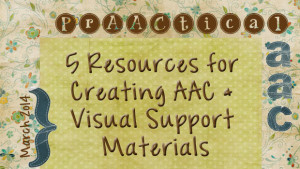
We are fortunate to be prAACticing at a time when there are so many options for creating visual supports and AAC materials. From sophisticated to simple From costly to free From PCS to SmartySymbols and more From one-time purchase to ongoing subscription From computer to mobile device There is a way for prAACtically anyone to make AAC materials, picture schedules, and other visual supports. Here are some of the products we use. Boardmaker Custom Boards SymPrint LessonPix ConnectAbility Visuals Engine
Filed under: PrAACtical Thinking
Tagged With: Boardmaker, ConnectAbility, Custom Boards, LessonPix, SymPrint, visual supports
January 15, 2014
by Robin Parker -
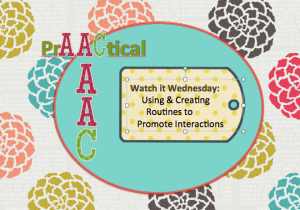
Watch some ways to use classroom routines to build in opportunities for interaction. http://youtu.be/Vl7q_cxjLSg
Filed under: PrAACtical Thinking
Tagged With: Routines, visual supports
January 9, 2014
by Carole Zangari -
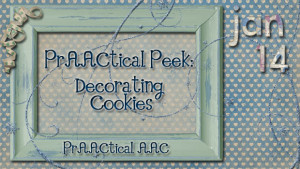
Welcome to PrAACtical Peek, an occasional series which features photos of therapy materials we use. This one is interactive, so have fun exploring the hot spots. Also, we’d love to have YOU get in on the fun. Send us a photo of some of your AAC materials for a future PrAACtical Peek post.
Filed under: PrAACtical Thinking
Tagged With: peek, therapy materials, visual supports
December 11, 2013
by Carole Zangari -
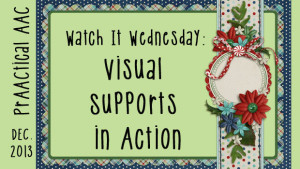
Visual supports are good teaching for ANY child, but particularly if there are issues with language processing. Check out this great example from The Teaching Channel. Direct Link: https://www.teachingchannel.org/videos/visual-cues-in-the-classroom
Filed under: Uncategorized
Tagged With: preschool, visual schedules, visual supports
September 23, 2013
by Robin Parker -
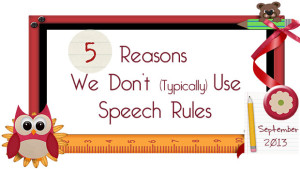
We love organized productive speech therapy sessions. But, we don’t typically use speech rules in our sessions. It’s not that we are inherently against ‘behavior speech rules’ but overall, we don’t use them. Here are some of the reasons why: We use meaningful language activities. We try to use meaningful, fun, and engaging activities so learners want to participate. Even when we think an activity is enjoyable and it is not, it becomes enjoyable and meaningful to “stop” the activity. It is helpful to think about meaningful and fun from the learner’s perspective and not just ours. For example, having a pleasant conversation about awesome pretty pictures would be enjoyable for many students. However, if conversation is difficult, maybe not so much. It’s not that we would not work on conversation, but the activity structure may involve clear beginnings and endings to the conversation, a ‘take home poster’, and/or a... [Read More...]
Filed under: PrAACtical Thinking
Tagged With: boundaries, meaninful language experiences, rules, visual supports
September 12, 2013
by Robin Parker -
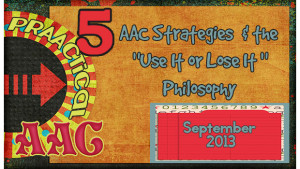
School has begun for almost everyone. Some classes have been in session for a while and routines have been formed, learning is taking place, behaviors have settled down. Now comes what can seem like the hard part: Keeping up with and expanding the strategies that helped students become successful. Instead of trying to fade AAC displays/devices and visual supports, stick with the basics and expand how they can be used. Because if you don’t use it, you may lose it. So: Keep up with: Visual Schedules– monthly, daily, and mini. Even if students know the schedule, continue to use it. Most of us would not like ‘losing’ our day planner or ‘to do’ lists even though we know our schedules. Aided Language Input First- Then Visual Support Visual Boundaries Access to a AAC Display/Device– And the display or device is with the student All the time, everywhere, charged, working, and... [Read More...]
Filed under: PrAACtical Thinking
Tagged With: aided language input, resources, visual schedules, visual supports
August 30, 2013
by Robin Parker -
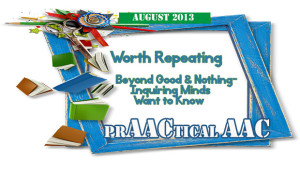
by Carole Zangari, originally published on August 27, 2012 “How was school?” (Good) “What did you do?” (Nothing) This scenario plays out in many cars and kitchens in the after school hours and it can be hard to know who is more frustrated: the kids for being asked or the parents for not getting satisfactory answers. And still, we repeat the process day after day. Of course, we want to know the fine details of what happened and how our children felt, but in some cases, we’d settle for ANY school-related conversation at all. I’ll be the first to admit that it took me way too long to get the hang of how to get information about my children’s school days, and it seemed like just when I did, pow! They were pre-teens and then teenagers. New rule book. Here are some ‘lessons learned’ along the way about those afterschool conversations and... [Read More...]
Filed under: PrAACtical Thinking
Tagged With: Conversations, visual supports









